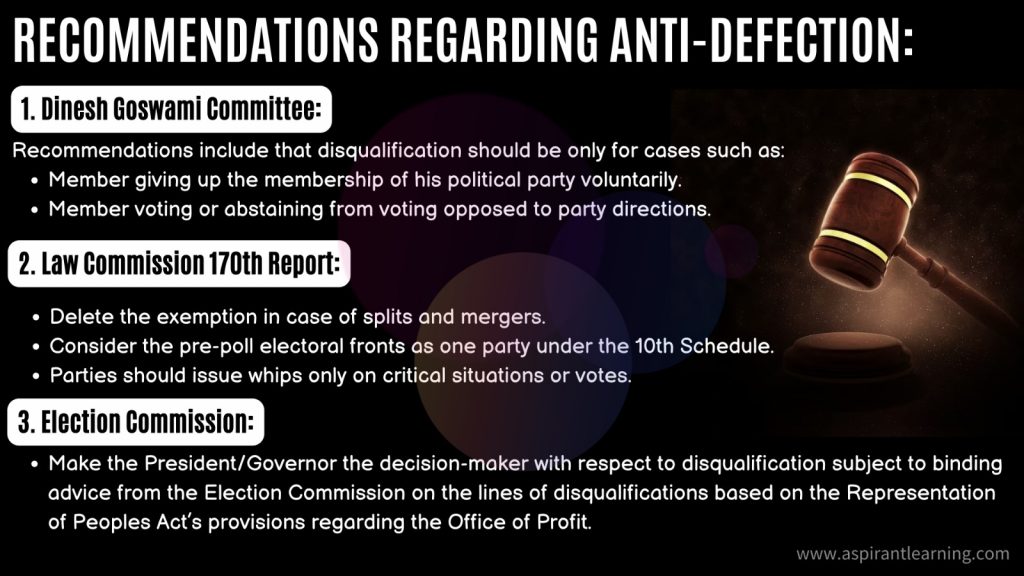News Highlights:
- The anti-defection law has drawn criticism for failing to accomplish its goals.
- There are several gaps in the law which encourage political opportunism and instability in the political system.
- To make the law more effective, there is a need for stricter enforcement and addressing the loopholes in the law.
The anti-defection law:
- About:
- The 10th Schedule of the Indian Constitution, popularly referred to as the ‘Anti-Defection Law’, was inserted by the 52nd Amendment (1985) to the Constitution.
- ‘Defection’ has been defined as “To abandon a position or association, often to join an opposing group”.
- The anti-defection law was enacted to ensure that a party member does not violate the party’s mandate, and in case he does so, he will lose his membership in the House.
- The law applies to both Parliament and state assemblies.
- The Anti-Defection Law aims to prevent MPs/MLAs from switching political parties for personal motives.
- The anti-defection law disqualifies individual Members of Parliament (MPs)/MLAs from leaving one party for another.
- Grounds for disqualification:
- If an elected member voluntarily gives up his political party membership.
- If he votes or abstains from voting in the House, contrary to any direction issued by his political party.
- If any member who is independently elected joins any party.
- If any nominated member joins any political party after 6 months.
- The decision on disqualification questions on the ground of defection is referred to the Speaker or the Chairman of the House, and his/her decision is final.
- All proceedings about disqualification under this Schedule are considered to be proceedings in Parliament or the Legislature of a state, as is the case.
- Exceptions:
- In a situation where two-thirds of the legislators of a political party decide to merge into another party, neither the members who decide to join nor those who stay with the original party will face disqualification.
- Any person elected as chairman or speaker can resign from his party and rejoin the party if he demits that post.
- Earlier, the law allowed parties to be split, but this has been outlawed.
- Defection deciding Authority:
- Any question regarding disqualification arising out of defection is to be decided by the presiding officer of the House.
- Objectives of Anti-Defection Law:
- It is to prevent defections motivated by the lure of office, material advantages, or other such considerations.
- It deters the legislators from shifting their political association to gain any personal advantages.
- It maintains stability in the party system and prevents the threat of toppling the governments.
- It promotes party discipline by ensuring that the legislators vote in favour of the party whip.
- It permits the merger of political parties without disqualification of members.
- It strengthens the institution of democracy and keeps corruption in check.

Loopholes with Anti-Defection Law:
- Paragraph 4 of the law:
- Paragraph 4 of the Anti-Defection Law creates an exception for mergers between political parties by introducing three crucial concepts: Original Party, Legislature Party and Deemed Merger
- Paragraph 4 does not clarify whether the original political party refers to the party at the national level or the regional level, even though that is how the Election Commission of India recognises political parties.
- Paragraph 4 states that a merger can occur only when an original party merges with another political party and at least two-thirds of the legislature party members have agreed to this merger.
- Paragraph 4 seems to be creating a “legal fiction” to indicate that a merger of two-thirds of legislature party members can be deemed a merger of political parties, even if there is no actual merger of the original political with another party.
- Undermining Parliamentary Democracy:
- After the enactment of the Anti-defection law, the MP or MLA has to follow the party’s direction blindly and has no freedom to vote in their judgment.
- The Anti-Defection law has broken the chain of accountability by making legislators accountable primarily to the political party.
- Controversial Role of Speaker:
- There is no clarity in the law about the timeframe for the action of the House Chairperson or Speaker in anti-defection cases.
- Some cases take six months, and some even three years. Some cases are disposed of – off after the term is over.
- No Recognition of Split:
- Due to the 91st Constitutional Amendment Act, 2003, the anti-defection law created an exception for anti-defection rulings.
- However, the amendment does not recognise a ‘split’ in a legislature party and instead recognises a ‘merger’.
- Allows only Wholesale Defection:
- It allows wholesale defection, but retail defection is not allowed. Amendments are required to plug the loopholes.
- It raises concern that if a politician leaves a party, s/he may do so, but they should not be given a post in the new party.
- Affects the debate and discussion:
- The Anti-Defection Law has created a democracy of parties and numbers in India rather than a democracy of debate and discussion.
- In this way, it does not differentiate between dissent and defection and weakens the Parliamentary deliberations on any law.
Conclusion:
- Nearly seven decades after our constitution’s implementation, our legislature sensed the need for some laws to control MPs or MLAs from switching parties for their interest. So this law was passed, but because of some loopholes, MLAs or MPs continued their malice practices with a slight difference.
- Jawaharlal Nehru said in the constitutional assembly that the nation’s work is never complete. So Until and unless these trends are not reined in, our current electoral and political situation is bound to deteriorate further. It will be a mockery of democracy if we fail to plug these loopholes because of such defections, changes/switching of the party by MPs and MLAs happening.
Pic Courtesy: Freepik
Content Source: The Hindu



